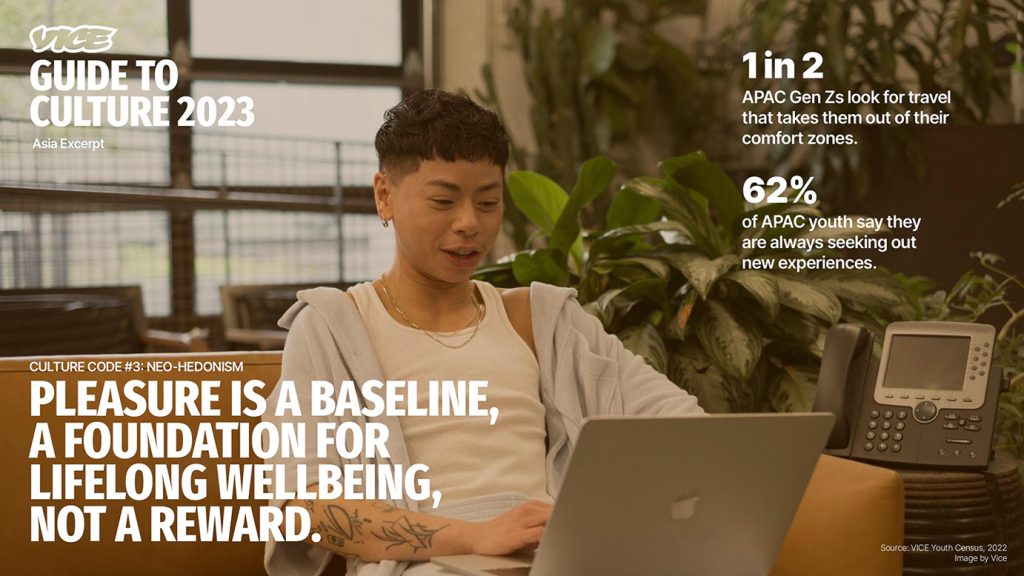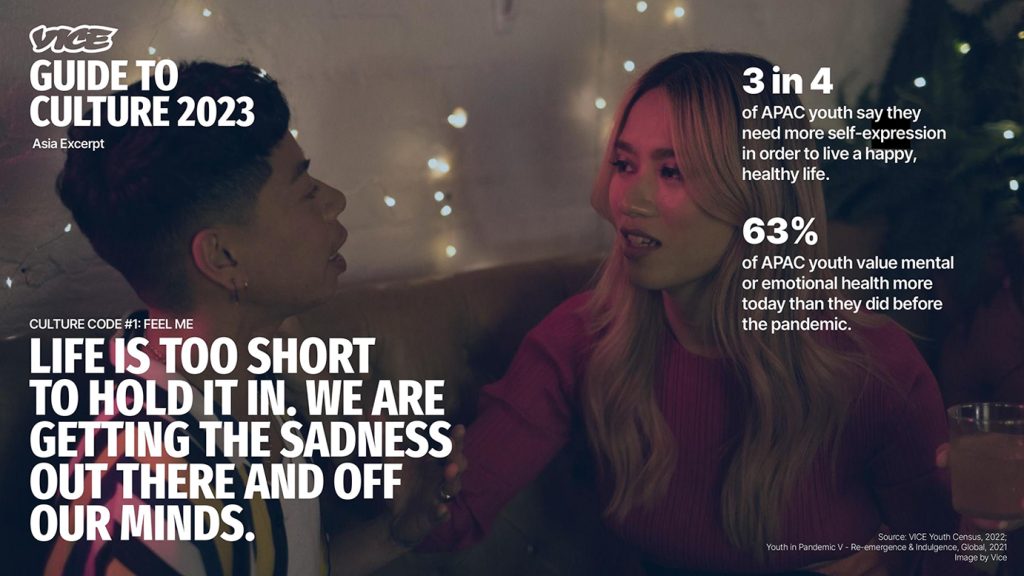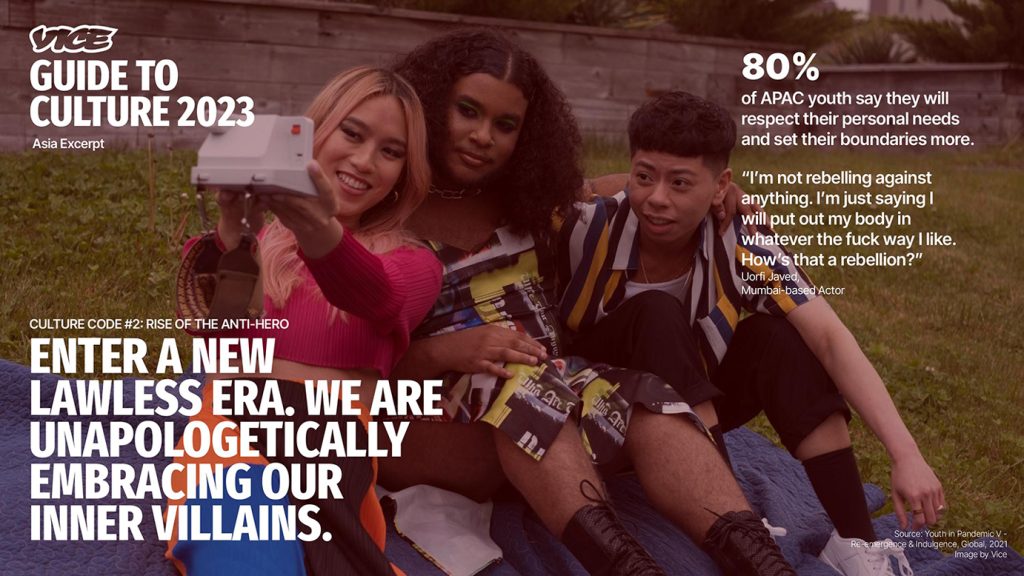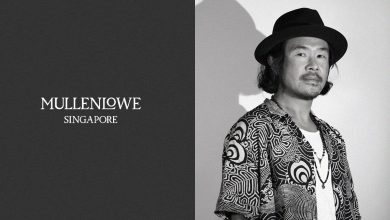SINGAPORE — Asia’s youth are defining a new era, breaking free from conventional codes and asserting themselves unapologetically, shunning the idea of perfection, embracing their inner anti-heroes and indulging in pleasures without guilt, the latest APAC excerpt from “The VICE Guide to Culture” reveals.
Drawing on insights from VICE Media Group’s network of journalists, content creators, tastemakers and its 40,000 strong global community of young people, including key APAC markets Indonesia, Singapore, Korea, India and Japan, the annual report for APAC focuses on three culture codes that captures the zeitgeist of Asia’s youth culture, to ensure brands stay relevant and a step ahead of emergent culture.
Culture Code #1: Feel Me
Today’s young people are pushing the boundaries of emotional expression, exploring new and unorthodox ways to share their innermost feelings. More than six in 10 of Asia’s youth say they value mental and emotional health more today than they did before the pandemic, and they are breaking new ground of where, when and how these feelings can be shared.
Young people in Asia have progressed the cultural narrative around emotional wellbeing to give space to those wanting to express their emotions. Three in four young people say they need more self-expression in order to live a happy, healthy life.
Cathartic pursuits have arisen from the ashes in their quest to find release. Youth are seeking alternative and often more playful mechanisms to emote feelings – from rage rooms and primal scream therapy, to the resurgence of personal diaries on Telegram where Gen Zs are sharing censor-less feeling dumps with a small number of subscribers, all of which provide a gateway to help them purge their collective fury or sadness.
Culture Code #2: Rise Of The Anti-Hero
Continued failings of institutions have forced Gen Zs to question who and what represents the right or wrong side. Seven in 10 believe that change for the better in society will come from its citizens rather than traditional mechanisms of power. In a world where societal norms have long dictated behavior, Gen Z are questioning these social scripts and moral codes, breaking down barriers and challenging traditional power structures.
Gen Z is on a constant quest for authenticity as they turn their backs on the overly-edited visuals of a bygone era. But this goes deeper. This isn’t just about being real and living in truth; it’s about embracing the facets of your personality that might make you a little bit more of a deviant than an angel. Whether it is Chinese and Korean women challenging the traditional conventions of presenting themselves as likable “good girls” by embracing the “bitch girl” attitude, or the popularity of boy love dramas taking the region by storm, Gen Zs are breaking tropes and social scripts, and redefining their own boundaries.
A rebellious spirit is afoot. 80% of Asia’s youth say they will respect their personal needs and boundaries more. Gen Z is unapologetically entering their “villain era” and embracing their inner anti-hero.
Culture Code #3: Neo-Hedonism
Gen Zs have long been called conscious hedonists. They’re flipping the trope of hedonistic pleasures, in pursuit of something far less performative – and far more mindful. For this generation, pleasure isn’t a flex, but a foundation for lifelong wellbeing. So they’re expanding their palette of pleasurable pursuits, debunking the notion of guilty pleasures, and finding everyday pleasures that are guilt-free.
More than six in 10 are constantly seeking out new experiences, leading them to expand the definition of and occasions for indulgence, and find ways to elevate their days or nights out by bringing multi-sensory hedonism into nearly every social or dining occasion.
They are finding pleasure in alternative escapes, with one in two looking for travel that takes them out of their comfort zones. Nine in 10 also say drinking and partying is not about getting wasted, with festivals such as Epizode in Vietnam – which combines raving with yoga, sports, group meditation, and healing sound sessions – growing in popularity.
Young people are rejecting the age-old “work hard, play hard” mindset, recognizing pleasure as a natural human need that is key to flourishing, as evidenced by the rejection of the extreme 996 culture in China. This is their generation’s YOLO, but with a collectivist twist: a deeply rooted belief that pleasure isn’t a luxury, but something important everyone deserves to have at all times.
Speaking about the implications for brands, Virtue Head of Strategy for APAC Huiwen Tow, the creative agency powered by VICE, said: “In this era where young people are unapologetically asserting their identity, beliefs and feelings, there is an opportunity for brands to facilitate shared rituals of release to forge a sense of belonging and community, and embrace the spectrum of emotion, including sadness and rage, to heighten engagement with an audience seeking raw and real connections.”
“Today’s young Asian consumers are also drawn to brands with unconventional heroic qualities and flaws that make them relatable. To stand out in a crowded marketplace, brands need to embrace a bit of the good, bad, beautiful, and ugly. By being multi-dimensional they can appeal to Gen Zs who define themselves by their authenticity, humanity and uniqueness,” Huiwen concluded.












